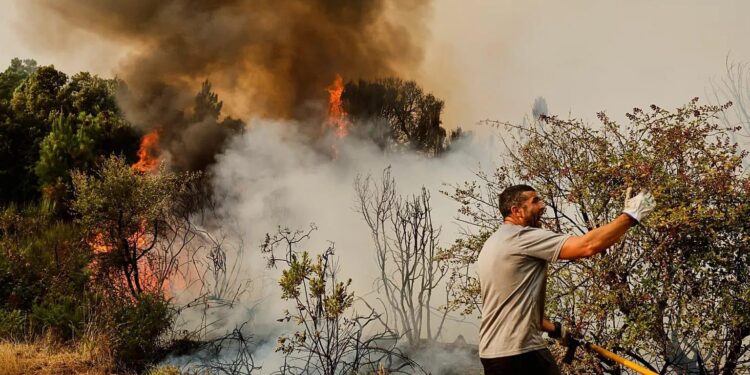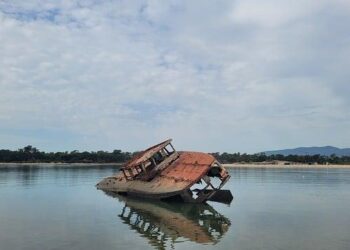Wildfires have erupted across Spain and Portugal, engulfing vast swaths of land and prompting widespread evacuations as Europe grapples with one of its most severe fire seasons in recent memory. The relentless blazes, fueled by soaring temperatures and prolonged drought conditions, have devastated communities, destroyed homes, and strained emergency response efforts. Authorities in both countries are battling to contain the infernos amid growing concerns over climate change and its impact on the continent’s increasingly volatile weather patterns. This latest outbreak underscores the escalating threat wildfires pose to Southern Europe and highlights the urgent need for comprehensive strategies to mitigate their devastating effects.
Wildfires Engulf Spain and Portugal Amid Unprecedented European Blaze Season
Blistering heatwaves combined with prolonged drought have fueled a string of catastrophic wildfires across the Iberian Peninsula, leaving dozens of communities severely affected in both Spain and Portugal. Authorities report that the fires, some of the largest in decades, have scorched tens of thousands of hectares, forcing the evacuation of thousands of residents. Firefighters continue to battle blazes with limited relief as temperatures remain in record highs, and shifting winds aggravate containment efforts. Local governments have declared states of emergency, deploying additional aerial and ground firefighting resources to mitigate the ever-expanding infernos.
This alarming fire outbreak is part of a broader pattern seen this season, with multiple European nations grappling with unprecedented wildfire activity. Experts attribute the surge to climate-induced factors, emphasizing the urgent need for coordinated transnational responses. Key challenges identified include:
- Extended drought conditions reducing soil moisture and vegetation resilience
- Extreme heat waves driving rapid fire spread
- Infrastructural strain on firefighting capabilities
- Limited community preparedness in high-risk rural areas
| Country | Area Burned (ha) | Evacuations | Active Fires |
|---|---|---|---|
| Spain | 48,000+ | 15,000+ | 27 |
| Portugal | 36,500+ | 9,000+ | 21 |
Climate Change and Human Factors Drive Escalating Fire Risks Across the Continent
Across the Iberian Peninsula and much of Europe, a lethal combination of rising temperatures and prolonged droughts has transformed forests and shrublands into tinderboxes, fueling unprecedented wildfire activity. Meteorological agencies report that record-breaking heatwaves and shifting precipitation patterns-direct effects of global climate change-have intensified the frequency and severity of fire outbreaks. Meanwhile, human activities, from unattended campfires to expanding urban developments near forested areas, significantly exacerbate the risk. Experts warn that this dual threat is overwhelming firefighting capacities and threatening both ecological balance and human livelihoods.
Key factors influencing the surge in wildfire incidents include:
- Extended dry seasons reducing natural moisture content in vegetation
- Increasing number of heatwave days leading to rapid fuel ignition
- Land-use changes such as deforestation and agricultural abandonment
- Population pressures expanding the wildland-urban interface
| Region | Avg. Temp Increase (°C) | Annual Fire Incidents | Percent Increase (5 yrs) |
|---|---|---|---|
| Portugal | 1.8 | 1,200 | 35% |
| Spain | 2.0 | 1,500 | 40% |
| Southern France | 1.5 | 900 | 28% |
Urgent Calls for Enhanced Forest Management and Emergency Response Strategies
The recent wildfire outbreaks across Spain and Portugal have exposed critical weaknesses in existing forest management policies and emergency response frameworks. Experts emphasize that proactive measures, such as controlled burns, reforestation with fire-resistant species, and improved land zoning, are essential to reduce the vulnerability of landscapes to uncontrollable fires. Without systemic changes to how forests are maintained, especially in fire-prone Mediterranean climates, the risk of similar or even more destructive blazes will continue to escalate. Additionally, increased investment in community education and engagement around fire prevention strategies remains a pressing requirement.
Emergency response infrastructures must also be enhanced to ensure rapid mobilization and coordination during wildfire events. Modernizing firefighting equipment, expanding aerial support capabilities, and integrating real-time satellite monitoring are key components of an effective response strategy. The following outline highlights priority areas for immediate action:
- Improved early detection: Expand use of advanced AI and drone surveillance for quicker identification of outbreaks.
- Cross-border collaboration: Strengthen coordination between neighboring countries for resource sharing and unified response.
- Community resilience programs: Train local populations in evacuation procedures and fire-resistant building techniques.
| Strategy | Current Status | Recommended Action |
|---|---|---|
| Forest Thinning | Limited & Irregular | Systematic, Annual Implementation |
| Firefighting Equipment | Outdated Vehicles & Tools | Upgrade & Increase Fleet |
| Emergency Training | Inconsistent Across Regions | Standardized & Regular Drills |
Concluding Remarks
As wildfires continue to consume vast areas of forest and threaten communities across Spain and Portugal, authorities remain on high alert, grappling with one of Europe’s most severe fire seasons in recent memory. With climate change intensifying drought conditions and fueling extreme heat, experts warn that such catastrophic events may become increasingly commonplace. Efforts to bolster firefighting resources and implement long-term preventive measures are now critical to mitigating the growing risks faced by the region. The unfolding situation serves as a stark reminder of the urgent need for coordinated action to address the escalating challenges posed by climate-driven disasters.
















